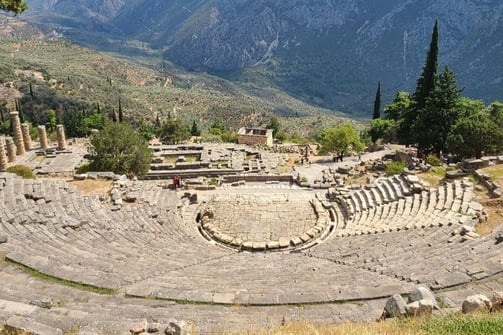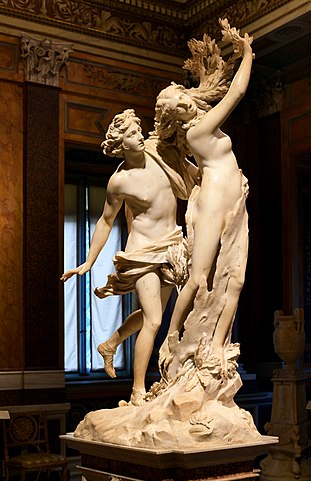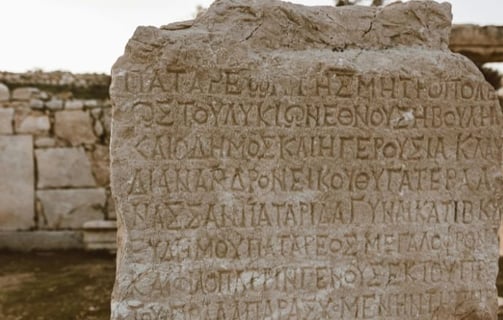Apollo: The Multifaceted Greek God
Discover the multifaceted Greek god Apollo, known for his influence over the Sun, music, prophecy, and healing. Learn about his mythological associations, key myths, and places of worship like Delphi. Explore Apollo's cultural impact and delve into the rich heritage of ancient Greek mythology.
GREEK MYTHOLOGY
7/14/20245 min read
Apollo. God of music, dance, Sun, light, and knowledge to name a few..


Mythological Associations
Apollo, one of the most revered deities in Greek mythology, is a figure of immense complexity and significance. As the son of Zeus and Leto, and the twin brother of Artemis, Apollo holds dominion over several vital aspects of ancient Greek life and culture.
Known as the god of the Sun and Light, Music and Poetry, Healing and Medicine, Prophecy and Oracles, and Archery, Apollo's influence is vast and multifaceted.
Apollo’s birth on the Greek island of Delos was a significant event, marking him and his sister Artemis as divine twins destined for greatness. One of the most famous myths surrounding Apollo is his victory over the serpent Python. By slaying this monstrous creature at Delphi, Apollo established the Oracle of Delphi, a sacred site where many sought divine guidance and prophecy.
The story of Apollo and Daphne is another well-known myth. In an attempt to escape Apollo's advances, Daphne transformed into a laurel tree, which Apollo then adopted as his sacred plant, symbolising eternal youth and glory.
Places of Worship
Delphi, located on the slopes of Mount Parnassus, is perhaps the most famous sanctuary dedicated to Apollo. The Oracle of Delphi played a crucial role in the ancient world, offering prophetic insights to those who visited.
The Pythian Games, held in Apollo's honour, included musical, athletic, and poetic competitions, reflecting Apollo’s diverse domains.
Another important site is Delos, Apollo's birthplace, which was considered a major religious center and hosted a significant temple dedicated to him.


Apollo’s Artistic Legacy & Impact
Apollo's influence extended far beyond his divine duties; he was a patron of the arts, symbolising the pinnacle of artistic achievement in ancient Greece.
His connection to music and poetry was embodied through his instrument, the lyre. The lyre, which Apollo is often depicted holding, was central to Greek musical culture. It was believed that Apollo's music could heal the sick and bring peace to the troubled. His artistic legacy also includes the Homeric Hymns, a collection of songs and poems celebrating the gods, in which Apollo often features prominently.
These hymns, attributed to Homer, were not just religious texts but were also used in educational contexts to teach Greek language and culture.
Apollo's role in healing and medicine underscores the importance of health and wellness in ancient Greek society, where he was often invoked for protection against illness and aid in healing.
Apollo and the Muses
Apollo's association with the Muses further cemented his role as a god of the arts. The Muses were nine goddesses who presided over various forms of artistic and scientific endeavor, such as epic poetry, history, and astronomy.
Apollo, as their leader, was often called the "Musagetes" (Greek: Μουσαγέτης - He who leads the Muses). Together, they inspired poets, musicians, and scholars, fostering the development of Greek culture and knowledge.
The partnership between Apollo and the Muses highlights the importance the Greeks placed on the arts and education, viewing them as divine gifts that enriched human life.


Apollo’s Relationships and Offspring
Apollo’s romantic and familial relationships are an integral part of his mythological narrative.
Despite his many pursuits, Apollo often faced challenges in love.
One of the most poignant stories is his pursuit of the nymph Daphne. Struck by Cupid's arrow, Apollo fell deeply in love with Daphne.
However, she did not reciprocate his feelings and fled from him. As Apollo chased her, Daphne prayed to her father, the river god Peneus, for help. In response, she was transformed into a laurel tree just as Apollo caught up to her. Heartbroken, Apollo declared the laurel his sacred tree, wearing its leaves as a crown to honor her.
Another notable relationship was with Coronis, a mortal woman.
Their union resulted in the birth of Asclepius, who became the god of medicine and healing, surpassing even Apollo in his medical prowess.
Apollo also had relationships with other figures, such as the nymph Cyrene, who bore him a son, Aristaeus, the god of agriculture and animal husbandry.
These stories reflect Apollo’s human-like qualities and the complexities of his character. His relationships and offspring played significant roles in various myths, showcasing different aspects of Apollo’s influence and legacy.


Festivals and Celebrations in Honor of Apollo
Throughout ancient Greece, various festivals and celebrations were held in honor of Apollo.
One of the most significant was the Pythian Games, held every four years at Delphi. These games were second only to the Olympic Games in prestige and included musical and poetic contests, as well as athletic competitions. Participants competed in Apollo’s honor, showcasing their physical and artistic talents.
Another important festival was the Delia, celebrated on the island of Delos. This festival included religious ceremonies, feasts, and competitions, reaffirming the island’s significance as Apollo’s birthplace. These festivals not only honored Apollo but also reinforced community bonds and cultural identity.
Linguistics & Inspiration
Apollo’s legacy continues to resonate in modern culture. His image and symbolism have been adopted in various forms of art, literature, and even space exploration.
The Apollo space missions, named after the god, symbolise humanity’s quest for knowledge and exploration, reflecting Apollo’s association with prophecy and enlightenment.
In literature, Apollo has been depicted in numerous works, from classical plays to contemporary novels, often representing the ideals of beauty, art, and intellect.
His influence can also be seen in modern music, where the lyre has evolved into modern string instruments, continuing Apollo’s musical legacy.




Apollo’s Influence on Modern Culture
In exploring the life and legends of Apollo, one gains a deeper understanding of ancient Greek values, beliefs, and their intricate pantheon of gods. Apollo's stories are not just tales of the past but are reflections of the rich cultural heritage that has shaped the Greek language and identity.
For those inspired by the myths and legends of Apollo, learning the Greek language can offer even more profound insights.
At the Greek Tutoring Hub, we are committed to providing a gateway to this ancient world through our comprehensive language courses, helping you connect with Greece’s timeless legacy.
Please feel free to share this post with fellow Greek Mythology and Greek language enthusiasts or to reach out to us if you have always wanted to speak Greek but did not what is the best way to start!
#apollon greek
#Greek gods
#Greek mythology
Find us on social media
© 2024. All rights reserved.
Quick Navigation
Information
Join our newsletter and download your free copy of our 'essential greek phrases cheat sheet' !
enquiries: +44 7858 148305
